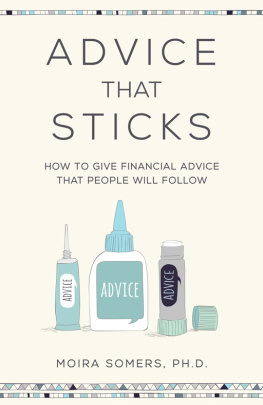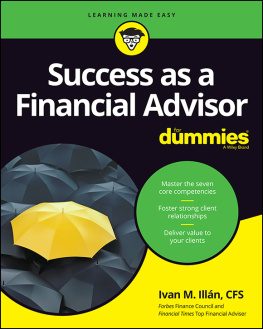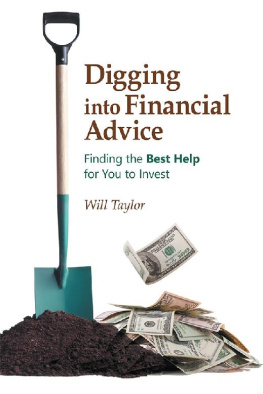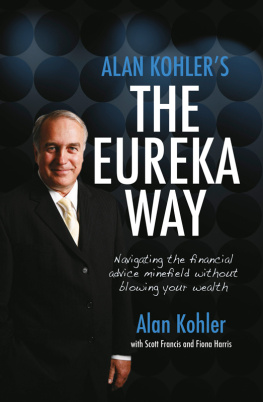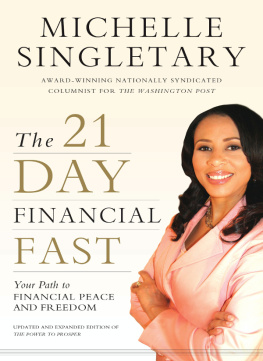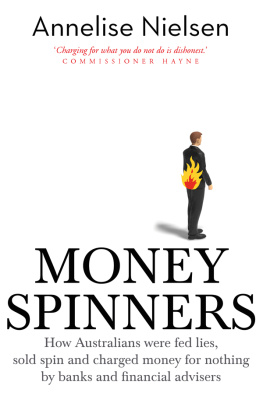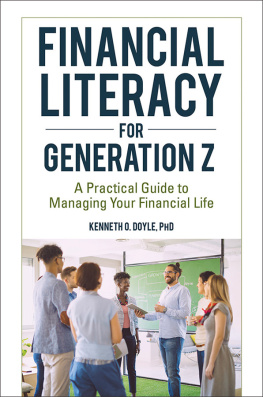Praise for
Advice That Sticks
Finally, someone is willing to tackle the complex issue of client compliance and how change occurs in the area of personal and business finance. Written by an expert in the field of financial psychology, the book delivers humility, humor and wisdom. It guides the reader in learning how to close the gap between good intentions and actions.
Courtney Pullen, M.A.
Author, Intentional Wealth
This is a great book! A worn and dog-eared copy belongs on the bookshelf of every financial advisor who views financial planning as a calling and a profession.
Rick Kahler, MSFP, CFP
Author, Conscious Finance
Consumers know they need to do things differently with respect to their money, but are often dismayed or baffled by their own self-sabotaging habits. Financial professionals have not always known how to be helpful in creating lasting behaviour change. Theyve relied too much on the provision of information and the occasional stern lecture. This book will change all that. It is superbly written, and well-positioned to help a lot of people.
Kelley Keehn
Finance author & consumer advocate
Dr. Moira Somers has given professional advisors an inspired gift in Advice That Sticks. She shares dozens of adherence-boosting strategies, including outstanding recommended questions to ask clients. I love Somers delightfully dry humor, which sparkles throughout! This books insightful, disciplined, evidence-based process will enhance advisors effectiveness as advice-givers.
Kathleen Rehl, Ph.D., CFP, CeFT
Author, Moving Forward on Your Own
With this book, every financial professional has access to deeply practical advice on how to listen, observe and respond while helping clients make their best life and money decisions. This is the book that connects financial planners and wealth advisors with the human experience of decision-making, commitments and adaptation to change.
Susan Bradley, CFP
Founder, Sudden Money Institute
Financial professionals need to understand their clients values, attitudes and beliefs about money, emotions, biases and social influences, and then connect with their clients with in a way that motivates and facilitates the right outcomes. This book highlights the importance of these skills along with Moiras helpful insights and guidance for providing advice that sticks.
Joan Yudelson, CFP
VP, Professional Practice,
Financial Planning Standards Council
ADVICE
THAT
STICKS
HOW TO GIVE FINANCIAL ADVICE
THAT PEOPLE WILL FOLLOW
MOIRA SOMERS, PH.D.
First published in Great Britain by Practical Inspiration Publishing, 2018
Moira Somers, 2018
The moral rights of the author have been asserted
All case studies have been anonymized and no real names have been used.
ISBN (print): 978-1-78860-014-9
ISBN (ebook): 978-1-78860-015-6 (Kindle)
ISBN (ebook): 978-1-78860-021-7 (epub)
All rights reserved. This book or any portion thereof may not be reproduced without the express written permission of the author.

For Jean-Louis
All these years later, Im still so happy to be stuck with you!
Contents
Introduction
H eres what Ive come to believe: Most people are at least mildly crazy when it comes to money.
I can say crazy with some authority. I am, after all, a psychologist. I know crazy when I see it. And there is nothing not full moons or federal elections or family get-togethers that draws the crazy out of people faster than money.
The author Geneen Roth describes it more eloquently:
It seems that money, even more than food, activates our survival instinct and makes wise, otherwise rational people behave like starving dogs. Any distorted or frozen patterns in our psyches will inevitably show up in our relationship with money, which makes it the ultimate repository for shadowy behavior.
Geneen Roth, Lost and Found
Craziness. Starving dogs. Shadowy behaviour. So are you sure you want to work with people and their money?
If your work involves giving people financial counsel, then their crazy, conflicted relationship to money is only one of the challenges you will face. Frankly, its not even the most formidable one. Factors such as the quality of your relationship with clients, their level of energy and insight, and a host of other social and environmental influences all contribute mightily to what the client will do with the recommendations you provide.
Unfortunately, the odds are high that you have not received much guidance on what to actually do about any of these other influences. As a financial professional, the bulk of your training and expertise lies in highly technical domains. You know the ins and outs of taxation, pensions, investment vehicles and insurance options. You are savvy about key market indicators and the interpretation of financial data. You know a great deal about the ethics and laws governing your professional activities. You know all about the best products and services to help people reach their goals.
But most financial professionals receive very little training in client psychology, and in the related art and science of giving advice. Advice that is timely, palatable, and easy for clients to understand. Advice that is custom-designed not only to be technically sound, but also to be just right in terms of the clients ability to receive and act upon it.
This book fills the gap in that training. I want you to be able to give financial advice in such a way that three things happen:
your great recommendations are followed by your clients,
your clients well-being is maximized as a result, and
you experience a massive boost in your career success and satisfaction.
Throughout this book, I will be sharing evidence-based, practical tips with you. These are strategies that have emerged from decades of research into two intriguing questions. The first: What makes it so hard for people to do the right things for their well-being? The second: What can be done to help them make lasting, meaningful changes in their behaviour?
Most of the earliest studies in this regard were targeted at health-related behaviours (things like quitting smoking or taking medication properly). The scope of the studies has expanded greatly since then. Broader applications of research findings have had a transformative impact on fields as varied as environmental protection and elite-level sports performance. It is high time for such a transformation to take place within the financial professions.
For the past decade, I have been adapting these strategies to help bring about lasting, meaningful change in the lives of the clients I see in my own work as a financial psychologist and executive coach. The approaches have been further field-tested and tweaked by the financial professionals I consult with around the globe. I am confident that you, like them, will find that these easy-to-implement strategies make a world of difference in your clients willingness and ability to follow your advice.
By the end of this book, you will know how to give advice that sticks. And perhaps just perhaps you might also find that you have been able to address some of your own areas of stubborn resistance to change. So read on to find out what an agitated professor and a wounded lumberjack have in common; how empathy, confidence, and blueberries can all be dangerous; and what my mother being branded a tart has to do with anything at all.
Two kinds of expertise are needed
Next page
